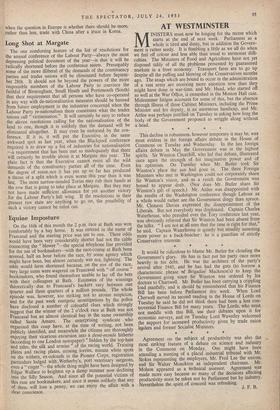AT WESTMINSTER
MINISTERS must now be longing for the recess which starts at the end of next week. Parliament as a whole is tired and dusty, but in addition the Govern- ment is rather seedy. It is fumbling a little as we all do when we feel off colour and less able than usual to surmount diffi- culties. The Ministers of Food and Agriculture have not yet disposed tidily of all the problems presented by guaranteed markets in a freer economy. Transport fares are to go up despite all the puffing and blowing of the Conservatives months ago. The snags which are bound to occur in the administration of a vast army are receiving more attention now than they might have done in war-time, and Mr. Head, who started off so well at the War Office, is enmeshed in the Moston Hall case. Midsummer fatigue accounts for some of this, but the absence through illness of three Cabinet Ministers, including the Prime Minister and his deputy, is an enormous handicap, and Mr. Attlee was perhaps justified on Tuesday in asking how long the body of the Government proposed to wriggle along without a head. * * * , • This decline in robustness, however temporary it may be, was most evident in the foreign affairs debate in the House of Commons on Tuesday and Wednesday. In the last foreign affairs debate in May the Government was in the highest spirits. Sir Winston Churchill, who led that debates illustrated once again the strength of his imaginative power and of his optimism. On Tuesday when Mr. Butler took Sir Winston's place the sun had gone in. The three Foreign Ministers who met in Washington could not corporately share Sir Winston's vision, and as a result the Government was bound to appear drab. (Nor does Mr. Butler share Sir Winston's gift of speech.) Mr. Attlee was disappointed with the results of the Washington conference though Labour as a whole would rather see the Government dingy than spruce. Mr. Clement Davies expressed the disappointment of the Liberals. But not everybody was' displeased. Captain Charles Waterhouse, who presided over the Tory conference last year, was obviously relieved that Sir Winston had been absent from the talks. " I am not'at all sure that the time is right for that," he said. Captain Waterhouse is quietly but steadily assuming more power as a back-bencher : he is a guardian of strictly Conservative interests. * * * * It would be ridiculous to blame Mr. Butler for clouding the Government's glory. He has in fact put his party once more heavily in his debt. He was the architect of the party's revival after 1945, and he has had the guts (to borrow a characteristic phrase of Brigadief Mackeson's) to keep the Government going since Sir Winston was ordered by his doctors to Chartwell. Mr. Butler has been carrying a crippling load manfully, and it should be remembered that his Finance Bill has been before Parliament this week. When Lord Cherwell moved its second reading in the House of Lords on Tuesday he said he did not think there had been a less con- troversial Finance Bill for many years. The Lords, who must not meddle with this Bill, use their debates upon it for economic surveys, and on Tuesday Lord Waverley welcomed the support for increased productivity given by trade union leaders and former Socialist Ministers. * * * * Agreement on the subject of productivity was also the most striking feature of a debate on science and industry in the Commons on Monday. One might have been attending a meeting of a placid industrial tribunal with Mr. Stokes representing the employers, Mr. Fred Lee the unions, and Sir Walter Monckton as independent chairman. Mr. Molson appeared as a technical assessor. Agreement was made more easy because so many of the decisions affecting productivity must be taken not by Parliament but by industry. Nevertheless the spirit of concord was refreshing. J. F. B.


























 Previous page
Previous page